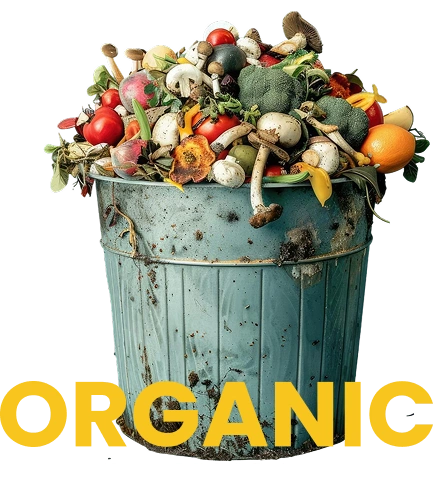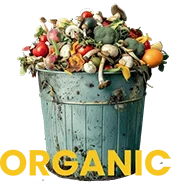What Are the BBMP Waste Segregation Rules 2025?
The BBMP has introduced new rules in 2025 with an aim to move towards a zero-landfill Bengaluru. The updated laws focus on segregation, recycling, and composting.
Key Provisions Under the 2025 Rules:
- Segregation at Source Is Mandatory
- Wet Waste (Biodegradable): Kitchen waste, food leftovers, vegetable peels, garden waste.
- Dry Waste (Recyclable): Plastics, cardboard, paper, glass, metal, tetra packs.
- Hazardous Waste: Sanitary pads, diapers, batteries, e-waste, paints, CFL bulbs.
- On-Site Waste Treatment for Bulk Generators
- Apartments, housing societies, hotels, and commercial establishments producing 50 kg or more of wet waste daily must install an OWC or similar composting unit.
- No Collection of Mixed Waste
- BBMP will reject unsegregated waste. If your society or business gives out mixed waste, it will not be collected.
- Heavy Penalties for Violators
- Fines range from ₹500 for individual households to ₹25,000 or more for bulk waste generators.
- Promoting Circular Economy
- The compost generated from OWCs can be reused in gardens or sold, reducing dependency on landfills.
Why the BBMP Waste Segregation Rules 2025 Matter
Many apartment associations and businesses often see segregation rules as a burden. But the reality is that compliance brings legal, environmental, financial, and social benefits.
1. Avoid Legal Issues and Fines
The BBMP is now serious about enforcement. If you don’t comply, you risk heavy fines and repeated penalties.
2. Reduce Landfill Burden
Bangalore’s landfills are overflowing. By composting waste at source, you prevent biodegradable waste from adding to this problem.
3. Health & Hygiene Benefits
Unmanaged wet waste leads to foul smells, pests, and mosquito breeding. Composting ensures hygienic processing of organic matter.
4. Community Responsibility
By adopting segregation and OWCs, apartments and businesses contribute to sustainable urban living, setting an example for others.
What Is an Organic Waste Composter (OWC)?
An Organic Waste Composter (OWC) is a machine designed to process biodegradable waste and convert it into compost.
How OWCs Work:
- Segregated Wet Waste Collection → Only food and garden waste are added.
- Shredding & Mixing → The waste is shredded into smaller particles and mixed with microbes.
- Decomposition Process → Microbes break down the waste under aerobic conditions.
- Compost Output → Within 7–10 days, organic manure is ready for use.
Benefits of Installing an OWC
1. Compliance with BBMP Waste Segregation Rules 2025
You meet legal requirements and avoid penalties.
2. Cost Savings in the Long Run
Instead of paying vendors or fines, your society can process its own waste economically.
3. Sustainable Compost Production
The compost can be used for landscaping or even sold.
4. Improved Cleanliness and Hygiene
No overflowing bins or foul smells.
5. Boosts Property Value
Eco-friendly apartments attract more residents and tenants.
Who Must Install an OWC in Bangalore?
According to the BBMP 2025 regulations, these entities are mandatory bulk generators:
- Apartments with 50+ flats
- Gated communities
- IT parks and commercial complexes
- Hotels and restaurants
- Schools, colleges, and universities
- Hospitals and healthcare facilities
Penalties for Not Following the Rules
The fines for non-compliance in 2025 are significantly higher:
- Households: ₹500 – ₹1,000 for giving mixed waste.
- Apartments / Societies: ₹5,000 – ₹25,000 per violation.
- Commercial Units: ₹10,000 – ₹50,000 depending on waste volume.
- Repeat Offenders: May face license cancellations or legal action.
How to Stay Compliant with BBMP Waste Segregation Rules 2025
Step 1: Educate Residents and Employees
Conduct awareness sessions about segregation.
Step 2: Provide Color-Coded Bins
- Green for wet waste
- Blue for dry waste
- Red for hazardous waste
Step 3: Install an OWC
If your society generates bulk waste, install a suitable OWC.
Step 4: Appoint Waste Champions
Assign residents or facility managers to monitor segregation.
Step 5: Partner with Authorized Recyclers
Tie up with BBMP-approved recyclers for dry and hazardous waste.
Step 6: Regularly Audit Waste Practices
Monthly audits ensure everyone follows segregation correctly.
Real-Life Example: How an OWC Changed a Bangalore Apartment Complex
A gated community in Whitefield with 200+ flats used to struggle with overflowing bins and vendor dependency. After installing an OWC in 2023, they:
- Processed 200 kg of wet waste daily
- Produced 60 kg of compost monthly, used for gardening
- Saved nearly ₹1.5 lakh annually on waste handling costs
- Received recognition from BBMP as a model society
This is proof that OWCs are not just about compliance—they add financial and environmental value.
Future of Waste Management in Bangalore
By 2025, BBMP aims to reduce landfill usage drastically. The focus is on decentralized waste management, where every community handles its own waste. OWCs are at the heart of this vision.
In the future, apartments with self-sustaining waste management systems will become the norm. This will lead to cleaner neighborhoods, better recycling rates, and a healthier urban ecosystem.
FAQs on BBMP Waste Segregation Rules 2025
1. Is segregation at source mandatory in Bangalore 2025?
Yes. Every household and bulk generator must segregate waste into wet, dry, and hazardous categories.
2. Is an OWC mandatory for apartments?
Yes, if your society generates more than 50 kg of waste daily, installing an OWC or similar composting unit is mandatory.
3. What happens if we give mixed waste?
BBMP will not collect it, and your society may face fines ranging from ₹5,000 to ₹25,000.
4. How much space does an OWC need?
For a 100-flat society, an OWC typically requires around 200–300 sq ft of space.
5. What do we do with the compost produced?
It can be used for gardening, landscaping, or sold to farmers and nurseries.
6. Can small households install an OWC?
Yes, households can use small-scale compost bins, though OWCs are mainly for bulk waste generators.
Conclusion
The BBMP waste segregation rules 2025 are a turning point in Bangalore’s waste management journey. Compliance is no longer optional—it is the responsibility of every resident, society, and business.
By adopting segregation at source and installing an Organic Waste Composter (OWC), you not only avoid hefty penalties but also contribute to a cleaner, greener city.
With the right system in place, waste is no longer a problem—it becomes a valuable resource. Let’s work together to make Bangalore a zero-waste city by 2030.






